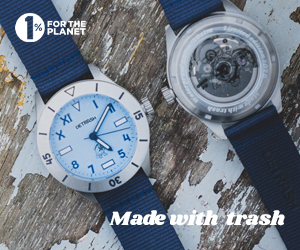 Sylvain Tesson doesn’t fit the stereotype of one who has spent most of his life travelling and then chose to isolate himself for half a year in the Siberian taiga. He looks fashionable, wears thick-framed glasses, a slim long black tie, and a checked suit. He seems confident. The first thing he does when we meet is check out the magnificent view over London and the Thames from the seventh floor of the Penguin Books headquarters. ‘Amazing,’ he describes the urban landscape he tries to escape time and time again.
Sylvain Tesson doesn’t fit the stereotype of one who has spent most of his life travelling and then chose to isolate himself for half a year in the Siberian taiga. He looks fashionable, wears thick-framed glasses, a slim long black tie, and a checked suit. He seems confident. The first thing he does when we meet is check out the magnificent view over London and the Thames from the seventh floor of the Penguin Books headquarters. ‘Amazing,’ he describes the urban landscape he tries to escape time and time again.
‘When I was living in the city as a student I was suffering,’ Sylvain explains his wanderlust. ‘I’ve been on the road for twenty years and it’s what makes me feel free. It’s as easy as that.’ Consolations of the Forest, his new book on his trip to Siberia, starts with a quote by Henry de Montherlant: Freedom is always available. One only need to pay the price for it. ‘Of course I pay a price,’ Sylvain says. ‘I don’t have children, I have no regular salary, I have no security. I have a precarious life. But I don’t mind paying that price. It’s worth it.’
Sylvain explains that his life is all about focusing on the present. ‘Tomorrow,’ he says, ‘doesn’t exist’. For him, ‘it is just a concept and people shouldn’t pay so much attention to the future. By the time you start thinking about tomorrow, you begin to live in a jail,’ he states.
Many of Sylvain’s statements are bold. He is self-assured and knows what he is talking about. Especially when it comes to solitude – a key element of his stay in Siberia.
‘Solitude is a choice and when it’s deliberate it’s beautiful and extremely fertile, full of inspiration,’ Sylvain says. ‘If you are alone you pay much more attention to your surroundings. You start concentrating on every single detail. Isolation is very intense.’ During his trip he shared his observations and thoughts with his notebook, which he calls his companion. The idea that someone might read his notes at a later point is enough sharing for Sylvain.
He admits that being alone wasn’t always easy. At times the traveller felt nostalgic and melancholic. But worse than being lonely in the wilderness tough, is being lonely surrounded by others in an urban space, he believes. In nature Sylvain feels a sort of fraternity with his surroundings, the animals, the flora. And he feels connected to the roots.
The main lesson Sylvain has learnt though has nothing to do with solitude. It has something to do with time. ‘I discovered a new relationship to time. I had become upset by how time flies, which in fact is a really banal and obvious sensation,’ the writer says. ‘Up to my trip to Siberia I had been travelling all my life. It was like a fever, an obligation to move, to be on the road, to harvest kilometres. Then I discovered that if you stand still, you can tame the time. Instead of trying to catch it you just let the time go through you.’
In his book he calls Siberia a paradise. Is it really – considering the fact that many inhabitants of this vast and sparsely populated region have little to no access to health care, education and employment? ‘It’s a big mistake to think that outside the borders of Europe there is hell,’ Sylvain answers. ‘That’s condescending. Many people in Siberia are very happy.’
It feels as if Sylvain had found out what life is all about, as if he knew the key to human existence. Relaxed and self-assured he sits in his armchair and knows an answer to every question. ‘I don’t intend to contribute to anything with my book. The trip was purely an experience for myself. Like all of my travels’ he says. ‘This might appear selfish but being a little selfish is good. This way I’m not trapped by the rules of society. I lead a monastic life.’
Sylvain doesn’t think he’ll ever stop travelling. It’s his life and his fulfilment. ‘Everyone has the choice to lead the lifestyle I do,’ Sylvain states. ‘In Europe at least. And it’s not because there are people who have less money or less possibilities than me that I won’t travel. Of course, someone from Angola would probably not be able to do it but if I am why shouldn’t I?’
 Consolations of the Forest by Silvain Tesson (Penguin), £16.99, is out now.
Consolations of the Forest by Silvain Tesson (Penguin), £16.99, is out now.













